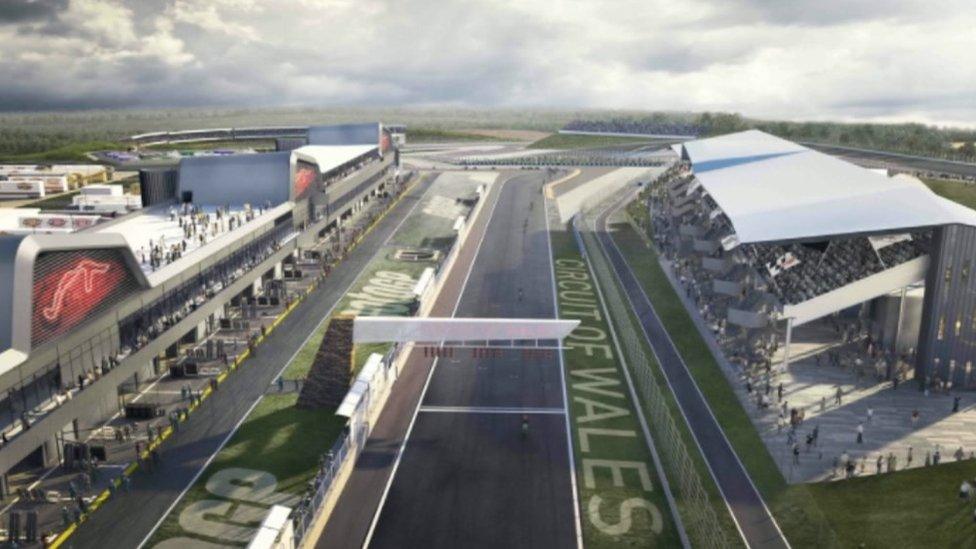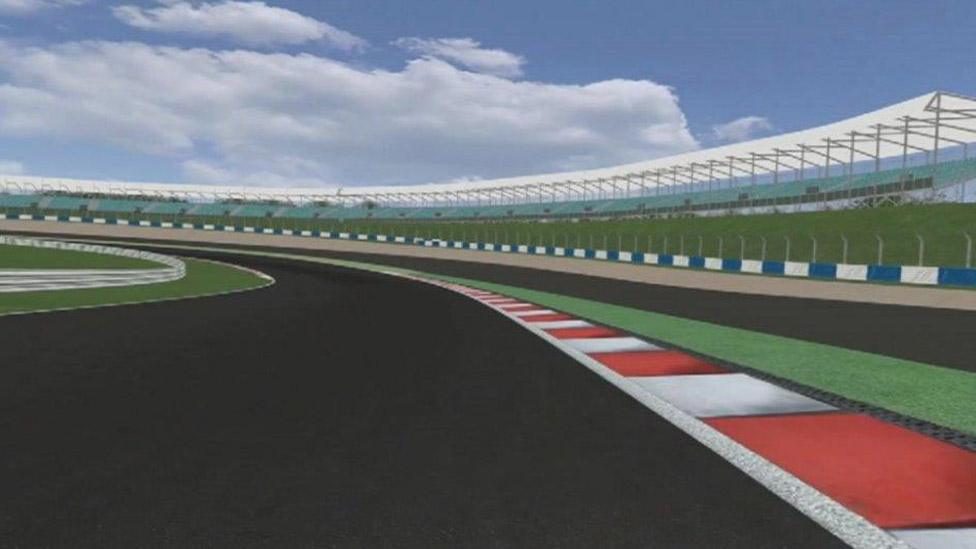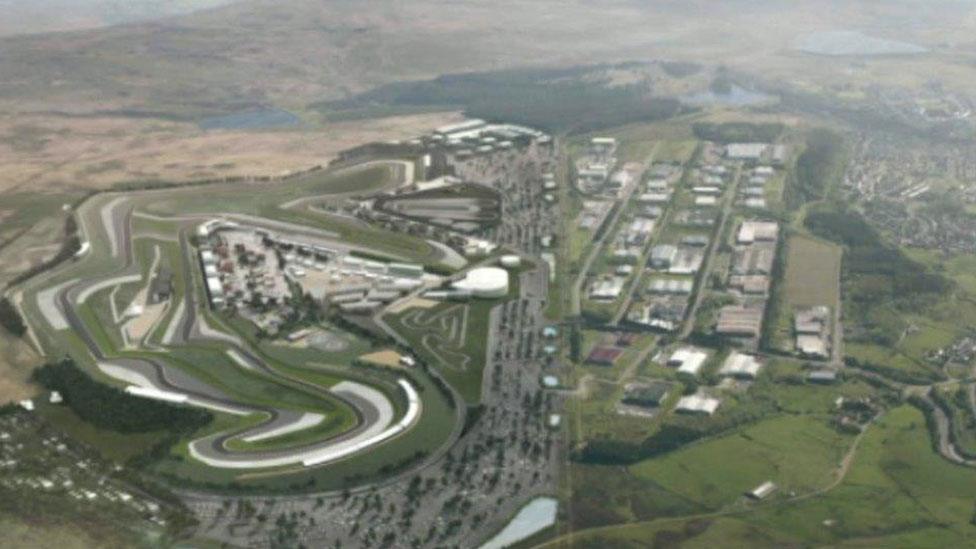Circuit of Wales: 'Flawed' decisions on public funding
- Published

There were "significant shortcomings" in the way £9.3m of taxpayers' money was spent on plans for Circuit of Wales at Ebbw Vale, a watchdog has found.
Funding was based on a "flawed" appraisal by Welsh Government according to the Wales Audit Office (WAO).
The Welsh Government, which is considering whether to underwrite more than £200m to build the course, said it was "disappointed" by the report.
Circuit of Wales said directors had been exonerated of "false claims".
The report has prompted calls for an investigation into whether ministers broke EU rules on funding private sector businesses, although Circuit of Wales, external said it has given them a "clean bill of health".
The Welsh Government is scrutinising details of the £425m project.
It wants to study plans in detail and perform due diligence before deciding whether to support the project further.
CGI of what a lap of the Circuit of Wales would look like
As well as a motorbike circuit, the proposals now include mountain bike trails, a BMX park, concert facilities and indoor skiing.
There are hopes of 6,000 jobs and 750,000 visitors a year, while the development has the rights to MotoGP until 2024.
The firm behind the project, the Heads of the Valleys Development Company (HoVDC) has had £9.3m of taxpayers' money in loans and grants so far.
Another £16m loan has been agreed but has not been handed over yet.
The WAO report said:
The Welsh Government only had a "limited" understanding of the companies involved in the project because proper checks were not carried out
There was no due diligence into businesses supplying services to the circuit, even though these suppliers were the ultimate recipients of public funds. Instead, the Welsh Government relied solely on information provided by HoVDC
Arrangements "did not provide strong enough security for public money"
Almost half the money went to nine companies or individuals with a close relationship to HoVDC and its shareholders
Payments were approved by the government "without sufficient evidence that services provided to the circuit project represented value for money"
Almost £1m went to a company called Aventa, owned by HoVDC's chief executive Michael Carrick.
However, the audit said £35,000 spent on Mr Carrick's garden in Cambridgeshire and £4,000 sponsoring political events was paid for by Aventa and not by HoVDC or public funds.
The Welsh Government guaranteed - and has since paid - a bank loan to HoVDC of more than £7m.
Ministers guaranteed the loan even though civil servants said it "would be very likely to be considered to be in breach of the (EU) state aid rules".
The project also received a property development grant of £2m, £300,000 of which was spent buying a motorcycle engineering company in Buckinghamshire called FTR.
The report said the Welsh Government could not explain "to our satisfaction" why it approved the funding, which was written off when FTR went bust.
The audit was launched following concerns raised by Monmouth MP David Davies who has been highly critical of the Circuit of Wales and has questioned whether it is viable.
"This can't possibly go ahead at the moment," he said.
"The idea of putting £200m of public money at risk with a company that's unable to account properly for the £9m it's had is totally unacceptable."
He called for a full statement by Economy Secretary Ken Skates and said there should be an investigation into whether EU rules were broken.
Mr Skates has promised to thoroughly assess the final plans for the project before deciding whether to help underwrite the cost.
Developers said the £430m they need would come from private sources, but they want the taxpayer to guarantee about £210m. A final decision is expected next month.
'Complex project'
Ministers had already turned down two earlier applications.
Auditor General for Wales Huw Vaughan Thomas said: "It's unfortunate that, in the case of the Circuit of Wales, we have identified significant shortcomings and so the Welsh Government needs to learn from my report, particularly if it decides to provide any further support for the project to progress."
Nick Ramsay, chairman of the assembly's Public Accounts Committee, said the report was the latest example of poor handling of Welsh Government funding for the private sector.
"I am particularly concerned that the auditor general has identified a lack of Welsh Government oversight of payments made by the project to related companies, and also the use of taxpayers' money to purchase a Buckinghamshire-based engineering company that later went into administration," he said.
Circuit of Wales said the report represents a "clean bill of health" for the plans and project and shows that its directors "have been completely exonerated of the false claims made over the misuse of public funds".
It added: "The report shows that we have always operated within conventional commercial practices, ordinary company activity and standard accounting processes and, where the specific Welsh Government loan is concerned, very carefully adhered to and implemented advice on spending eligibility provided by the Welsh Government's relevant officials."
A Welsh Government spokesman said it was disappointed by a number of aspects of the report.
"For example, the report makes repeated reference to our agreement to provide £16million repayable business finance to HoVDC, but fails to acknowledge that we subsequently took that offer off the table for this latest proposal - despite us pointing this out to the Wales Audit Office," he said.
He described it as "a complex project", but added: "We are satisfied that we have assessed risk against value for money for the taxpayer and have sought to secure the maximum security available from the developer."
The spokesman said funding support was provided to help develop the business proposition for the circuit, to secure planning permission and private finance.

Analysis by Sarah Dickins, BBC Wales economics correspondent
Circuit of Wales is very different from most other projects which have asked for help from the Welsh Government.
For a start, many companies asking for assistance already have some assets, against which a loan or grant can be given.
But this is a project that has grown from a blank sheet of paper - very different from an Aston Martin or a Ford seeking support for investment.
Grants or loans are often made against existing assets, allowing the tax-payer to be reimbursed if fortunes change.
But the HoVDC was specifically set up to develop the Circuit of Wales.
It is a regeneration project for undeveloped moorland; an ambitious plan originating from a blank piece of paper. So, there are no traditional assets to secure or underpin financial support, making it a more risky decision.
The report makes clear that it is not judging the viability of the project but rather how the Welsh Government made decisions about its initial support package, how it managed risks and how it checked funding was used for what it was meant to.
This is the first time we have been able to see the details of negotiations between the developers and the Welsh Government. It explains some of what has been going on behind the scenes - and what has clearly been an uncomfortable and chastening experience for some of those involved.
- Published29 March 2017

- Published8 February 2017

- Published5 January 2017

- Published13 July 2016
